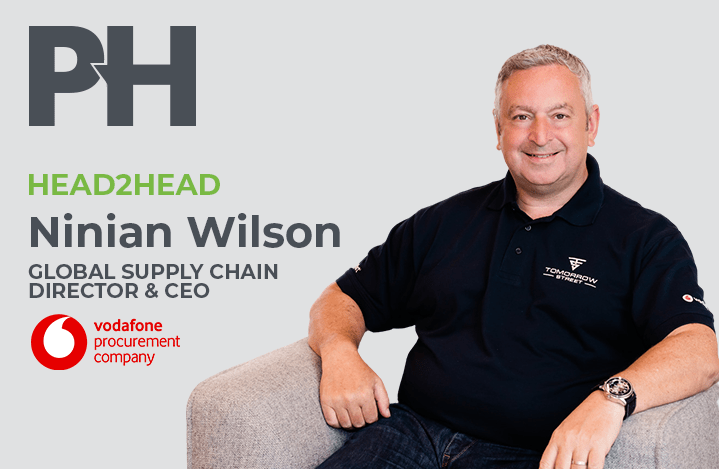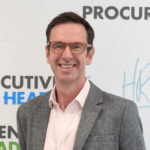For Procurement Heads‘ latest Head2Head, he spoke with Rupert Gaster to share more about what Vodafone is doing around sustainable procurement and his recent win at the Procurement Excellence Awards.
How did you get into procurement?
Like a lot of people who go to university, I wasn’t quite sure what I wanted to do.
In my last year at Aberdeen University, we went on something called the “milk round”, I applied to four companies, BP, British Rail, Bank of Scotland and British Gas, so I never got past B in the alphabet!
When you are living in Aberdeen a lot of the jobs were oil industry-related, but the only jobs I could apply for back then were purchasing and supply chain.
I got the call from British Gas to join their supply chain department. Back then it was called ‘supplies and transport’ and that is really how my career began.
Listen to the podcast here.
What are you most passionate about within procurement?
Your view changes over time.
When I first started I was keen to learn the profession and was interested in physical logistics, I got into the procurement side later.
But now it is really around our ability to influence a supply chain, I am particularly proud of our work around health and safety and also the work we are now doing on both the planet and diversity and inclusion are, for me, the big things we are working on right now.
What are you doing in regards to sustainable procurement?
It is the topic of our time.
If you look at our carbon footprint as a telecommunications player it is significantly driven by our supply chain management activity, we are highly focused on working with our supply partners to help them reduce and decarbonise their supply chain so that we, and our customers, can benefit from that.
So, decarbonisation of the supply chain and working with our vendor base on that is number one.
The second is closer to my heart really and is around inclusion and opportunity, I am a great believer that you have got to drive that opportunity piece and drive that diversity and inclusion in the same way you have to in your workplace whether it is around gender diversity or colleagues who are in the LGBT+ community or whether it is people of colour.
I think that has shifted significantly from a supply chain perspective in the last two or three years.
For myself, as someone who grew up on a very small island in the middle of nowhere, sometimes you lack a bit of confidence as you see other people who are educated in a different way or have had a better start than you.
I am very committed to everybody having the same opportunity to progress whether that is because you are a man or a woman or part of the LGBT+ community or whether you are a person of colour, that opportunity I think is a human right.
It is not the same everywhere in the world but I think corporate and procurement people have a big responsibility to address that and we also have the tools to influence how the supply chain is.
It is my most passionate area.
What challenges do you face in making those big issues a reality?
If I start off with the planet agenda we have at the moment, we as a leadership team are hugely data-driven.
We talk about savings, value delivered, spend, all that analysis. It is quite difficult getting a strong handle on CO2 throughout the supply chain.
We are doing a lot of work in estimates of estimates and I don’t particularly like that. I would like to have more granularity of information.
This is probably an area where a number of telecommunications companies could work together to make that transparency in the supply chain more relevant and accessible, then we could really measure when we do something if it is making an impact and helping to decarbonise.
It is really important, you don’t want to make statements and then not be able to track them back to real delivery and to show improvement.
On diversity and inclusion, we are in a strong position as we have a large European footprint and we have a large African footprint, we have been working on gender inclusion and diversity for 10 years and we have made some really good progress.
I still think many of our middle managers are still learning the language and we need them to be more confident in the language so they can have more of a dialogue, whether that is on LGBT+ matters or whether that is on Black Lives Matter.
I think developing that confidence for the discussion is an education piece.
What is your biggest achievement so far?
I think personally it isn’t necessarily one contract but it is the opportunity for me to work for a company such as Vodafone, which has been fantastic and the opportunity to live abroad.
In our small subsidiary of Vodafone in Luxembourg, we have 60 different nationalities, it is a fantastic family that is very diverse.
You learn so much as an individual.
Working for a great company and living abroad, getting that exposure to another company for me that whole experience has been fantastic and one I love every day working for Vodafone.
Where do you take inspiration from as a leader?
Over my time I have worked for some fantastic managers and there is always a bit of conditioning depending on who you work for.
I worked for David Nimle, who was inspirational for me in my first managerial position. I remember him saying to me, “I ask you questions then I ask you to go away and think about some options.”
David used to say his job was to just coach me through the options as he said he knew I knew the answer but it was his job to open my perspective a little bit, he was an absolute inspiration to me.
Then I had the fortunate opportunity to work with Adam Crozier who was the Group Chief Executive of Royal Mail, lately ITV and now he has gone on to be the Chairman of one of our big competitors BT.
Adam was very quietly spoken but tremendously inspirational.
I remember taking an organisational construct to him, and he said, “You wouldn’t want to do anything just now as it would be kind of stupid wouldn’t it, you want to learn the job a bit more” and I have said, “Yeah of course Adam.”
That little bit about learning and reflecting quietly I think again was quite inspirational for me as an individual in my career.
I am fortunate enough to have met some of these people. I have also met sportsmen and women who have been up there. I met Philippa York as part of my role at Vodafone, she is an inspirational individual who has gone through so much to get to her true self.
They always say you shouldn’t meet your heroes because you will be disappointed. That was not the case.
What advice would you give to someone embarking on a career in procurement?
There is always a couple of things I would say to people, I would say first of all you have always got to be yourself, I don’t think you should try and be someone that you’re not, because that mask falls quite quickly.
Under pressure, your true self will come out.
Secondly, I would say really bring new fresh thinking.
Any organisation can get a bit stuck and we kind of rely on new people coming in with new ideas, even if they don’t work straight away or not at all, if you don’t try stuff you don’t change anything.
So yes, bring your true self to work and really push that innovation.
Even if it is not successful, learn from where it went wrong. That whole trial and error and innovation is something we are all striving for but we don’t really have the recipe.
What role did the procurement function play in enabling Vodafone to face the pandemic?
There are probably two things to start with – to all of our colleagues at Vodafone and to all of our suppliers you have got to say a big thank you.
I think the function was quite well-positioned when we entered into Covid but if we are honest none of us knew what was going to happen.
We had quite a high level of digitalisation anyway so we could continue to do procurement and continue to sign contracts.
The physical logistics and supply chain continues to work even though it was quite stressful at certain points.
The commitment and support from all of the colleagues at Vodafone was absolutely outstanding. The care for others and the support really came to the fore, it really felt like a family dealing with a crisis and we came together really well.
What do you enjoy doing in your spare time?
I am one of these rare people who like both rugby and football!
My team is Aberdeen and they are now eight games without a win and lost on Saturday so that’s a bit of a disaster!
I also follow and watch the Scottish rugby team which has been pretty tough for the last four or five years as well!
I love sports, I also enjoy the Ryder cup.
We have three little West Highland Terriers at home called Clyde, Argyle and Beaut. They all have little attitudes and we are renovating an old place up in Scotland which is really good fun.
We couldn’t finish this without mentioning the award you received last week for Leader of the Year at the Excellence in Procurement Awards 2021.
First of all a big thank you to the Chartered Institute of Purchasing and Supply it is fantastic to be recognised and for me quite embarrassing as well I was fortunate enough that my kilt still fitted after lockdown!
For me it is not about Ninian at all, it is really about the supply chain management team at Vodafone and Vodafone as a company and their view on how it wishes to drive its supply chain forward and all of the supply chain we work with.
For me, that is a recognition of all of the colleagues I work with at Vodafone and Vodafone as a company.
It was nice to go and collect it and the kilt still fitting was the nicest thing!
It was a nice event that was really well run by the Chartered Institute, they did a fantastic job.






